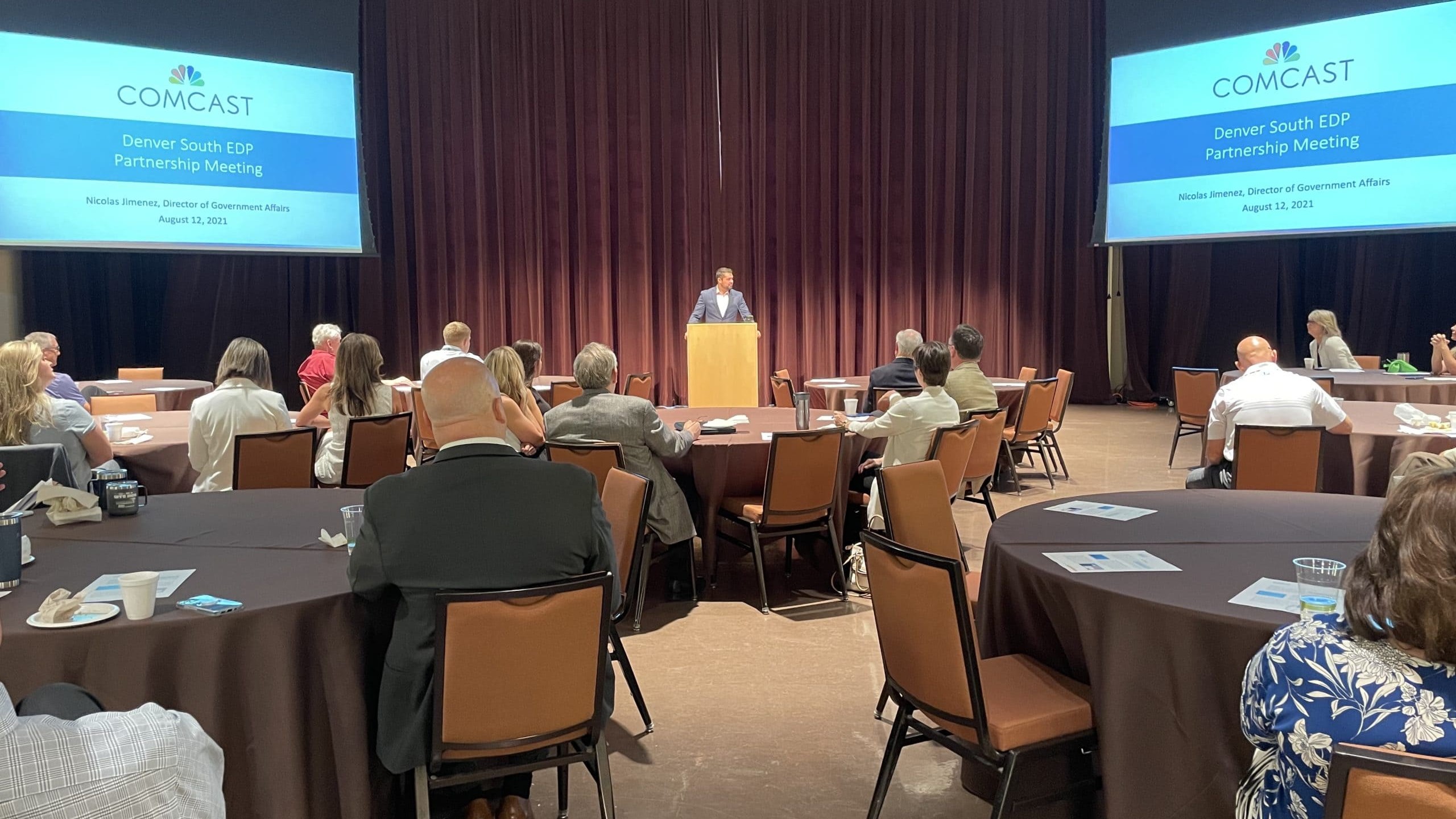October’s partnership meeting focused on transportation and transit in Denver South, and the role that innovation and infrastructure will play in furthering the success of the region.
City of Lone Tree Mayor Jackie Millet introduced the meeting and gave her thoughts around the theme. She voiced her perspective that transportation is key to the success of the Denver South region, and is at the heart of efforts to improve air quality in the area. She highlighted some of the challenges that public transit currently faces, such as changing travel patterns and falling demand due to COVID-related safety concerns. She also mentioned the importance of last-mile micro-mobility solutions such as the Lone Tree Link On Demand, which helps Lone Tree residents move more easily around the community.
Paul Jesaitis, Region 1 Transportation Director of CDOT, kicked off the presentations by giving an overview of the scope of Region 1’s work. Extending from east of Denver to the I-70 Eisenhower Johnson Memorial Tunnel, Paul’s region is responsible for maintaining 3,689 lane miles, serving half of Colorado’s population.
In addition to maintaining existing infrastructure, Paul and his team are involved in major projects intended to future-proof Colorado’s roadways. A key endeavor Paul highlighted is the I-25 South Gap project between Monument and Castle Rock. This project, which is on budget and on schedule to be completed in late 2022, will ease congestion on a thoroughfare that is vital to the wellbeing of Denver South. He also talked about other projects intended to modernize Colorado’s roads, such as the Smart 25 Pilot Project, a ramp metering system intended to reduce congestion and improve travel times on northbound I-25 between Ridgegate Parkway and University Boulevard.
On the topic of public transit, Brian Welch, Senior Manager, Planning Technical Services for RTD, talked about how RTD is redesigning its network for the future. Brian explained how the pandemic caused a shock to public transit as people stopped using it, compounding user issues that had started with declining bus use. Moreover, the profile of transportation is changing – for example, weekday boardings no longer show peaks in the mornings and evenings due to commuters; instead, boardings are more even throughout the day. As Denver metro’s population continues to grow – with a 31% increase expected by 2050 – RTD needs to meet or exceed anticipated demand and be resilient into the future.
In response, RTD is looking at how its operations currently serve customers, and how these operations can be improved in preparation for this projected demand. RTD has discovered that the design of its existing network was too complex, and that a simpler network could also be the more effective one. Brian believes users want simple, consistent, and reliable services. However, RTD faces challenges bringing service back to previous levels in light of current hiring and retention trends. Bus drivers are retiring, but younger workers are not replacing them. He believes this is a structural problem for the entire transit industry and one that all agencies need to collaborate on to solve. For RTD to succeed in the future, attracting and keeping a strong workforce will be critical.
Bill Sirois, Senior Manager of Transit Oriented Communities for RTD, followed Brian and highlighted efforts to review fares and increase equity among riders. Previously, RTD conducted studies to simplify the fare system and—based on its findings—implemented new programs to support low-income riders, such as the LiVE Program and youth fare discounts. However, they continued to receive feedback that fare prices were too high and the fare system too complicated. The study planned for 2022 aims to lower fares without reducing services and findings will be implemented in 2023.
Suggested Reading:
While other panelists touched on the importance of micro-mobility, Nico Probst, Director of Government Relations for Lime Micromobility, focused exclusively on the subject. Lime Micromobility provides electric scooters and bikes in the Denver area. Nico outlined the company’s history in Denver and how Denver had been one of the first US cities to pilot electric scooters in 2018. Earlier this year, Lime signed a five-year contract with Denver to provide electric scooters and e-bikes to the city. This longer-term engagement has also enabled it to expand to Boulder, and Colorado Springs, where it recently launched.
According to Nico, Denver is now one of the top five cities globally in terms of the ridership of electric scooters and e-bikes, and the company is making investments in expanding its fleet, updating technology, and creating parking solutions to accommodate the vehicles. Over 200 new parking facilities for scooters and bikes have been permitted around Denver. Installation of these will be starting in the coming months. Accessibility and equity are important to Lime, so the company is rolling out adaptive vehicle technology over the next year for those with different mobility needs. In terms of equity, Lime is introducing a new pricing structure specific to make rides more affordable in disadvantaged areas of the city. They are also offering free rides for people who qualify for local or federal assistance programs.
Watch the full meeting below and look out for the details of our next Partnership Meeting next year.

